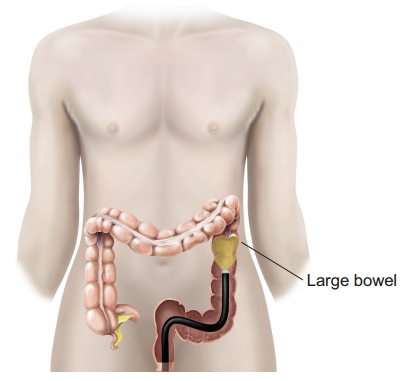What is a colonoscopy?
A colonoscopy is a procedure to look at the inside of your large bowel (colon) using a flexible telescope (see figure 1). A colonoscopy is a good way of finding out if there is a problem in your large bowel. Sometimes a polyp (small growth) is the cause of the problem and the endoscopist may be able to remove it during the procedure.
Are there any alternatives to a colonoscopy?
Other options include a barium enema (an x-ray test of your large bowel) or a CT colography (a scan of your large bowel).
What does the procedure involve?
A colonoscopy usually takes 30 to 45 minutes. If appropriate, the endoscopist may offer you a sedative or painkiller. The endoscopist will place a flexible telescope into your back passage. Air will be blown into your large bowel to help the endoscopist have a clear view. The endoscopist will be able to look for problems such as inflammation or polyps. They will be able to perform biopsies and take photographs to help make the diagnosis.
What complications can happen?
- Allergic reaction
- Breathing difficulties or heart irregularities
- Blurred vision
- Infection
- Making a hole in your colon
- Bleeding
- Incomplete procedure
How soon will I recover?
If you were given a sedative, you will usually recover in about two hours. You may feel a bit bloated for a few hours but this will pass. The healthcare team will tell you what was found during the colonoscopy and discuss with you any treatment or follow-up you need.
You should be able to return to work the next day unless you are told otherwise.
Summary
A colonoscopy is usually a safe and effective way of finding out if there is a problem with your large bowel.
Acknowledgements
Author: Mr Jonathan Lund DM FRCS (Gen. Surg.) Illustrations: Medical Illustration Copyright © Medical-Artist.com
This document is intended for information purposes only and should not replace advice that your relevant health professional would give you.
